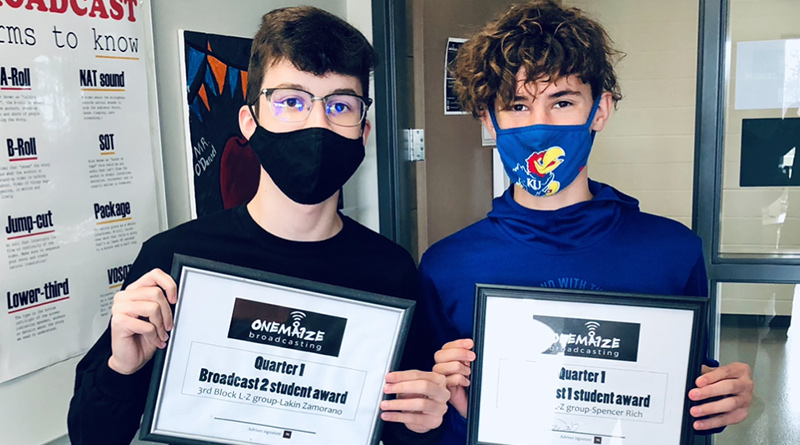4 Reasons to Use Contest and Competition to build Culture with your Journalism team

There’s no question that the pandemic has made advisers question their priorities, initiatives and focus during the 2020-2021 academic school year. This includes the daily battles our students are fighting to work with reliable sources for stories on the web, crafting never before seen visuals and images to build our yearbooks and even trying to produce news and feature shows while working remotely and not having the proper equipment and technology.
No matter what student publication or media you advise, your traditional instruction has been rocked by uncertainty and may have you searching for ways to inspire, motivate and instill purpose with your student journalists to finish out the spring semester.
Look no further than your local, state and national journalism contests. It’s time to start creating competition within your own staff to celebrate award-winning journalism work and light a fire with your team to start the 2021 calendar year.
1. Small staff? Little enthusiasm? Start SMALL.
If your staff has been split due to being Hybrid or Full Remote or you are rebuilding a journalism program, find a way to enter just a couple to a few entries in your state’s scholastic press association or become involved in the many contests JEA offers throughout the year. Your small team may need a morale booster and many of our students right now are suffering from isolation issues from the pandemic and are carrying significant self doubt about their abilities as creators. If you believe your staff isn’t quite ready to participate in local and state contests and you’re wanting to save the advertising revenue you have brought in this year, consider weekly photo contests internally with your staff or quarterly/semesterly awards that give credit to new staffers, experienced staffers and try creating fun, innovative awards for those staffers who go thankless at times. By entering a contest or two, you’re having conversations with your staff and letting them know you BELIEVE their work is of high quality, you WANT them to feel good about the work they are creating in your class and they DESERVE to earn that recognition to build their portfolio and an infusion of positivity in their life!
2. Building the future of the program THROUGH an award-winning mindset!
Whether you’re in the process of creating a strong journalism culture at your school or a powerhouse program within your state, using competition and contests within your curriculum builds an award-winning mindset and sets a standard of work for your current and future staff. One quote that stands out to me from JEA Executive Director Kelly Glasscock (who heard this from previous JEA Executive Director Kelly Furnas) is, “We don’t create work to win awards, we just create try to create award-winning work” really can set the tone for the baseline of expectations with expanded storytelling, eye-popping graphics and visuals and a priority on 21st century media content blended into your coverage. When you’ve had a successful year with your staff and you’ve added plaques and certificates to your journalism room, you are setting the tone for the students taking your intro classes for the KIND of program you are trying to build. Make sure to constantly reflect with your group as to WHY it’s important to have this award-winning mindset and the doors/opportunities that can open for your journalists their junior and senior year when they believe in the importance of competition and contest.
3. Lack of support from administration or district? Fake news media? Squash those ideas dead in their tracks.
Even if you’re laying the foundation to create a strong journalism culture at your school or continuing the rich tradition of impactful journalism created for your community, it’s important to let these contests and competitions validate the LEVEL of work your students are creating. There are hundreds of high school programs around the country that often create content at a collegiate and even sometimes professional level, so double down on what is working with your student media team and highlight your attributes. This could be strong photo galleries with storytelling captions, deep features shedding light on important figures or even multimedia content that brings visual stories that other programs and organizations simply cannot replicate. Your program, your students and the work you are creating for your school and community is highly valuable as a public relations tool and a way to showcase the BEST parts about your school. For programs struggling with enrollment, battling revenue issues or aren’t taken as “serious” as other elective and AP courses, winning competitions and contests sometimes can be the validation your administration and department heads know that your team is creating at a high level and is a valuable commodity to your school. You should not have to prove yourself with contest and competition recognition, but at times, this could mean the difference in budgetary discussions, the building of your classes and journalism sequence at your school and showing your school and community that your student journalists should be taken seriously for their quality of work and superior creations.
1.Large program? How you can piece together the puzzle.
If you have a student media team with over 20+ students, it’s likely you’re spending significant time planning, organizing and structuring your staff to meet your program’s needs. This means your students are all working on different projects with multiple staggered deadlines at any given time, and you will often have a few students with dead time after completing a deadline. This is a great time to fine tune “mini-skills” such as caption writing and such, but you can also capitalize on this free time by including contest work before they hop into their next project. Creating a grid/spreadsheet of your entries for a large contest can be very helpful to keep you organized, especially when your students are rotating days coming in (Hybrid) or are Full Remote. Accountability for your students working virtually can be INCREASED dramatically when integrating contest work into their workload or off time. I also try to focus on “double dipping” where my students can be working on their next assignment that would also count as a contest entry for a local or state contest. In a year where students are juggling more hours at work to help their family and other new duties at home due to the pandemic, creating less work by “double dipping” can motivate students to not only create strong content for their grade in the course, but meet their contest needs and deadlines as well. It’s a win-win situation for the adviser and our student journalists!
In conclusion, I hope at least one of these tips can provide some insight on why creating internal contests in your own room or putting entries into a local, state or national contest can certainly boost morale, energy and dedication to your publication for your student journalists. There’s no question this will increase your workload and take up free or plan time to integrate these ideas into your weekly plans, but the payoff will be one that is long term and will positively impact your students beyond their time in your classroom. Take the plunge for your students-they need these opportunities in your classroom more than ever right now!


